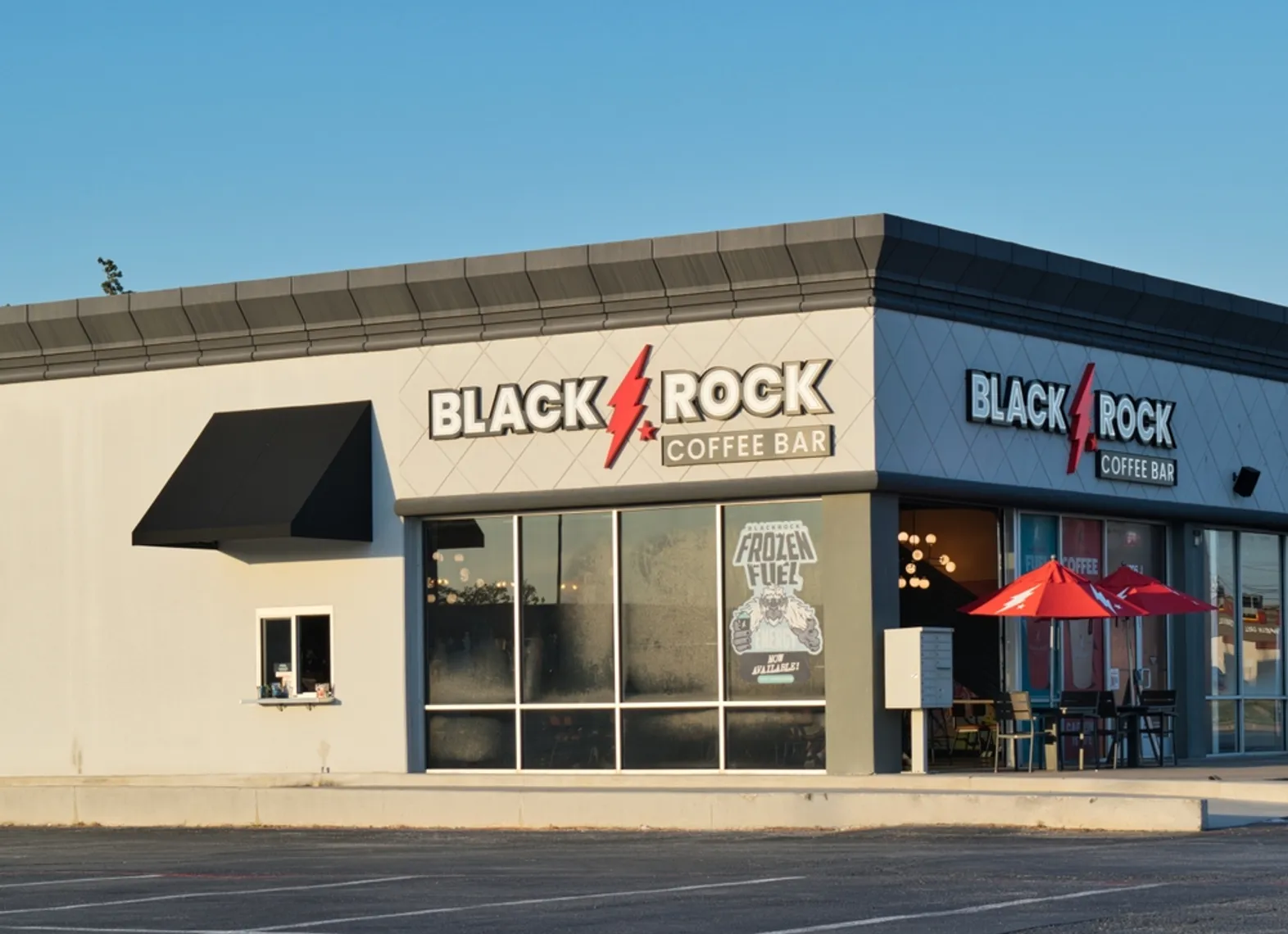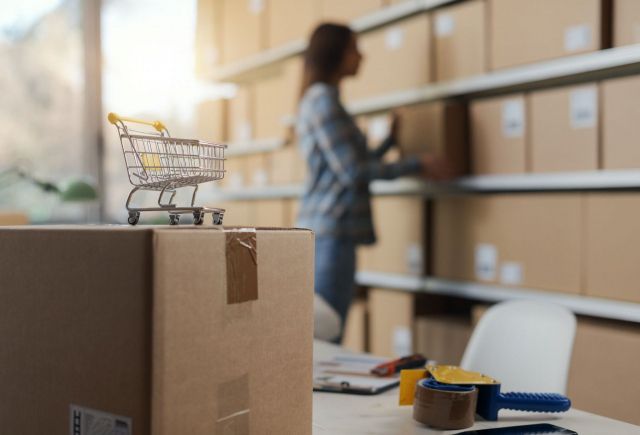Black Rock Coffee Bar IPO: how to trade Black Rock Coffee shares

Learn about Black Rock Coffee Bar’s completed IPO, the factors that may affect its share price, and how to trade Black Rock Coffee stock via CFDs.
Newly listed stocks are often highly volatile, and early trading can involve rapid price swings and significant risk.
When was the Black Rock Coffee Bar IPO date?
Black Rock Coffee Bar, a drive-thru coffee chain headquartered in Scottsdale, Arizona, completed its initial public offering (IPO) in 2025, priced at $20 per share, raising $294 million. Trading commenced on Nasdaq on 12 September 2025 under the ticker BRCB, implying a valuation of $956.3 million.
Founded in 2008 in Oregon, Black Rock has become one of the fastest-growing coffee concepts in the western United States. With 158 locations across seven states as of mid-2025, it positions itself as a regional challenger to Starbucks and Dutch Bros, blending drive-thru convenience with a strong community-oriented brand.
Key factors influencing the IPO timing include:
-
IPO market recovery: US listings accelerated in 2025 after two subdued years, creating a more welcoming window for consumer IPOs.
-
Growth momentum: Black Rock posted 24% year-on-year revenue growth in H1 2025, reaching $95.2 million, while narrowing net losses to $1.9 million.
-
Sector rarity: consumer and retail IPOs have been scarce compared to tech and healthcare deals, giving Black Rock more visibility.
-
Capital needs: IPO proceeds will fund new store openings, supply chain upgrades, and debt reduction.
-
Competitive landscape: with rivals like Starbucks and Dutch Bros trading actively, investors have clear benchmarks for valuation.
What is Black Rock Coffee Bar?
Black Rock Coffee Bar is a US drive-thru coffee chain founded in 2008 in Beaverton, Oregon, by Jeff Hernandez and Daniel Brand. With a focus on suburban and regional markets underserved by larger national chains, it emphasises community branding, quick service, and energy drink offerings alongside coffee. Unlike Starbucks, which positions itself as a ‘third place’ for sit-down customers, Black Rock prioritises speed and convenience, akin to Dutch Bros, which has cultivated a cult following in western states.
Key milestones in Black Rock Coffee Bar’s history
-
2008 – founded in Beaverton, Oregon by Jeff Hernandez and Daniel Brand.
-
2015–2019 – expansion across Oregon, Arizona, and Washington, building a strong regional base.
-
2020 – reaches 75 locations despite pandemic disruptions.
-
2022 – headquarters moves to Scottsdale, Arizona to support national growth.
-
2025 – operates 158 locations across seven states; files for IPO targeting ~$860m valuation.
Black Rock’s key features
-
Drive-thru focused – fast-service model suited to commuters and convenience-driven customers.
-
Product mix – speciality coffee, cold brews, teas, and proprietary energy drinks.
-
Culture-driven brand – marketing emphasises local community ties and customer loyalty.
-
Expansion strategy – opening clusters of stores in regional markets to build density and brand awareness.
-
Competitive set – positioned between Starbucks (premium, nationwide) and Dutch Bros (youth-oriented, fast-growth).
Black Rock has carefully positioned itself as a lifestyle brand with regional authenticity. Its stores emphasise a ‘community first’ approach, sponsoring local events and cultivating loyal followings. While still small compared to Dutch Bros (nearly 900 stores), Black Rock’s IPO highlights its ambition to accelerate expansion into new markets like Texas and Colorado.
How does Black Rock Coffee Bar make money?
Black Rock’s revenue model is straightforward and mirrors other quick-service restaurants (QSRs) in the sector.
|
Revenue stream |
Description |
|
Beverage sales |
Coffee, espresso, teas, smoothies, and proprietary energy drinks form the bulk of revenue. |
|
Food sales |
Breakfast items, pastries, and snacks offer incremental revenue, though smaller in share. |
|
Merchandise |
Branded mugs, apparel, and loyalty rewards merchandise. |
|
Franchise/royalty revenue |
A small but growing part of its income as it tests franchising in select markets. |
In H1 2025, Black Rock reported $95.2 million in revenue, up 24% year-on-year, with a net loss of $1.9 million.
A distinguishing feature is Black Rock’s energy drink line, marketed as a house-branded alternative to Red Bull or Monster. These products carry higher margins and appeal to younger demographics, providing a second growth driver beyond coffee.
What might influence the Black Rock Coffee Bar live stock price?
Now that its listed Black Rock’s stock performance will depend on both internal execution and broader market forces.
Macroeconomic and sector trends
Coffee is considered an affordable luxury, and consumer spending trends will influence demand. Inflation in food commodities—particularly coffee beans, dairy, and sugar—could pressure margins, while rising wage costs across QSRs are another factor. On the positive side, the growing preference for drive-thru formats aligns with Black Rock’s business model, providing structural demand tailwinds.
Company fundamentals
Investors will closely watch Black Rock’s ability to maintain double-digit revenue growth while narrowing losses. The pace of store openings, same-store sales, and improvements in store-level profitability will be critical.
Competition and innovation
Black Rock competes directly with Starbucks and Dutch Bros, as well as regional independents. Its edge lies in cultivating brand loyalty in local markets and offering unique energy drinks alongside coffee. The risk is that its relatively small scale could limit bargaining power with suppliers and landlords. Innovation in menu items, loyalty apps, and customer engagement will determine whether it can keep pace with better-resourced rivals.
Regulatory and governance landscape
Labour practices in the coffee sector have been under scrutiny, with unionisation drives hitting Starbucks in recent years. While Black Rock is smaller, investor perception of its employment practices could affect sentiment. ESG factors, such as ethical sourcing of coffee beans, may also play a role in how sustainable-focused funds view the stock.
Market sentiment and trading behaviour
As one of the few consumer IPOs of 2025, Black Rock will attract attention simply by being in a sector with limited new listings. Its performance may also be benchmarked against Dutch Bros, which debuted in 2021 and saw early volatility before stabilising. Early trading will hinge on whether investors see Black Rock as a high-growth challenger with a scalable model, or as a niche regional player.
How to trade Black Rock Coffee Bar share CFDs
Now that Black Rock Coffee Bar has listed, trading its shares via contracts for difference (CFDs) allows you to speculate on its price movements without owning the underlying stock.
How to get started
- 1. Choose a platform Use a trusted broker like Capital.com, offering access to thousands of CFDs.
- 2. Open an account Verify your identity, complete a suitability questionnaire, and set preferences.
- 3. Add funds Deposit via card or bank transfer. Start small and manage risk carefully.
- 4. Track Black Rock’s performance Monitor charts, technical indicators, and IPO news for trading signals.
- 5. Go long or short If you expect the price to rise, go long; if you expect it to fall, go short. Apply stop-loss* and take-profit levels to manage your trades.
Note: Newly listed stocks can be volatile, especially in the early days of trading. CFDs let you act on price swings in either direction, but always apply risk management. CFDs are traded on margin, and leverage higher than 1:1 magnifies potential losses and gains. Past performance is not a reliable indicator of future results.
Learn more about contracts for difference in our CFDs trading guide.
*Standard stop-losses are not guaranteed. Guaranteed stop-losses incur a fee when activated.
Which consumer and coffee stocks can I trade?
While you wait for the Black Rock IPO, you can explore related companies:
-
Starbucks (SBUX) – the world’s largest coffeehouse chain.
-
Dutch Bros (BROS) – US drive-thru coffee chain with rapid growth.
-
Keurig Dr Pepper (KDP) – beverage company with coffee and soft drink exposure.
- McDonald’s (MCD) – QSR giant with significant coffee and beverage sales.
FAQs
Who owns Black Rock Coffee Bar?
Black Rock Coffee Bar was founded by Jeff Hernandez and Daniel Brand in 2008. Today, the company is majority-owned by private equity backers who supported its growth into a 158-store chain. Post-IPO, public shareholders will own a portion of the business, though founders and early investors will retain influence.
How much is Black Rock Coffee Bar worth?
Black Rock’s IPO indicated a valuation of around $956.3m, based on the share price range.
When will Black Rock Coffee Bar IPO?
Black Rock Coffee has completed its IPO, and its shares commenced trading on Nasdaq on 12 September 2025 under ticker BRCB.
Will Black Rock Coffee Bar be available to trade as a CFD?
Yes. Capital.com offers Black Rock Coffee Bar CFDs after listing. CFDs allow traders to speculate on price movements without owning the stock directly. CFDs are traded on margin. Leverage higher than 1:1 increases your losses and gains, which amplifies risk.
Discover more upcoming IPOs
Stay informed on upcoming IPOs, market trends, and the newest trading opportunities

Pattern Group IPO
